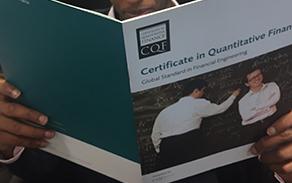FinTech and the Future of Quant Finance

What is FinTech?
The intersection of finance and technology, FinTech, has been a strong force in transforming the financial industry for decades. Recent developments include increased use of automation in trading and investment management, tremendous gains in the speed and bandwidth of communications networks, which makes algorithmic and high-frequency trading possible, and deep analysis of vast datasets through machine learning to evaluate investment opportunities, optimize portfolios, and mitigate risks. These technological advances are influencing the directions of both fundamental and quantitative investing and have given rise to a hybrid form of investment analysis, known as “quantamental” investing.
Where does FinTech sit in relation to quant finance?
Historically in the financial markets, technology was deployed quite early to assist with data processing and task automation. As Modern Portfolio Theory emerged in the 1950s and 1960s, the use of machines was a natural fit for those seeking to analyze stocks, assess the efficient frontier, and engage in portfolio optimization. With the rise of option pricing and quant trading in the 1970s and 1980s, computers became a cornerstone of the derivatives market. In the early 1990s, electronic trading platforms were introduced and pushed the global expansion of the stock, bond, and credit markets through the 2000s. For quant finance in particular, the spectacular growth in the volume and variety of data has driven intense activity in machine learning in the 2010s, and that effort continues today.
How has FinTech changed the financial services industry the most?
Some of the key areas for FinTech in quant finance include:
- Risk analysis: coordination with regulators, and compliance with stress testing and other mandates.
- Algorithmic or “black box” trading: fully automated systematic trading that provides speed and efficiency across a range of trading venues. Also, of interest to quants, high-frequency trading is the execution of algo trades on ultra-high-speed, low-latency networks in tiny fractions of a second.
- Market microstructure: global financial markets have fragmented over time, from large institutional exchanges like the NYSE and NASDAQ into multiple trading venues including electronic exchanges, alternative trading systems, and dark pools. FinTech is at the center of this matrix and the global financial markets depend on it.
- Data science: the unprecedented growth of data – from traditional data sets including asset prices, financial statements, and economic indicators, to alternative data sets gathered from social media networks, satellite imagery, credit card transactions, and sensor networks, for example.
How has the rise in AI in finance played an important role in FinTech?
The use of Artificial Intelligence and its subfield Machine Learning (ML) in finance date back to the 1980s, but ML has gained momentum in the data science revolution of today. Although ML has been around for decades, the tools, techniques, availability of vast data sets, and processing power have only come together in recent years. Some types of analysis focus on text, some on natural language processing, and others look at sensor networks, satellite imagery, or credit card data to develop insights on weather patterns, global trade, or retail trends, for example. Text analysis uses machine learning techniques to derive insights from company filings, quarterly earnings calls, news, social media posts, and email, for example. Natural language processing (NLP) is related to text analytics and includes speech recognition, sentiment analysis, and topic analysis. NLP analysis can be used to identify trends and discern certain indicators about a company, a stock, or an economic event that could impact short-term performance. There are many complexities in finding the signals amidst the noise of voluminous data, but machine learning has become a central theme in finance over the past decade, providing opportunities for quants in many areas of the market, from boutique hedge funds to the largest institutional investors.
What do we need to watch out for?
Although there is great enthusiasm about the power of ML, there are ample reasons for caution. Human judgment in still required to assess the data, clean the data sets properly, and select the right techniques for a given type of analysis. Further, ML models may not perform well if the data set is limited or has missing elements. ML is also subject to the risks of overfitting or underfitting the data; in overfitting, one may discover spurious relationships or erroneous patterns that will lead to flawed forecasts. In underfitting, true parameters are seen as noise and the models may fail to discover meaningful patterns in the data, even though they could exist. Finally, from an investor relations and regulatory standpoint, ML techniques may seem to be opaque or “black box” approaches that produce results that are not well understood or explained easily. These are important themes for further research and development as ML techniques are increasingly applied in many financial markets.

The Future of FinTech
In a recent poll by the CQF Institute, the vast majority of those polled (61%) believed that the most important future trend in FinTech will entail quantum computing. Initiatives are underway at investment banks including JP Morgan and Goldman Sachs, with predictions that quantum computing may have practical applications in finance in five years or so. Time will tell, but the research opportunities for quants with strong physics and computer science backgrounds will continue to grow.
On FinTech more generally, in the same CQF Institute poll, there were mixed reactions to the question of whether FinTech will replace banks in the future; 39% saying yes, 34% saying maybe, and 26% maintaining that they would not replace banks. From a practical standpoint, although automation, Internet banking options, and remote banking (ATMs) have gained ground, particularly during the pandemic, it is likely that people will still want brick and mortar banking options, with human advisers available to them for the foreseeable future.

Quant skills are needed for the FinTech future
Whatever the ultimate directions are for the financial industry, a solid education in all aspects of quant finance including financial math, programming, and data science are essential for career growth. The poll conducted by the CQF Institute showed that respondents valued the computer science components most highly in terms of basic skills needed for working in FinTech, with 73% favoring data science and ML, and 23% favoring programming languages.
Both Data Science and Programming are given strong emphasis in the CQF curriculum, with lectures, labs, and tutorials given throughout the program and two full modules devoted to Machine Learning. In addition, starting in the January 2022 cohort, a new quantum computing lecture will be introduced, in order to ensure that CQF delegates have access to cutting edge information in this emerging field
The story of FinTech in the financial markets reaches far back into market history, but the scope and pace of the evolution taking place today is exciting for students, those new to the job market, and experienced practitioners alike.
Explore the latest quant techniques on the CQF program, download a brochure or join the next online information session to hear more and ask questions to the CQF Program Director.




